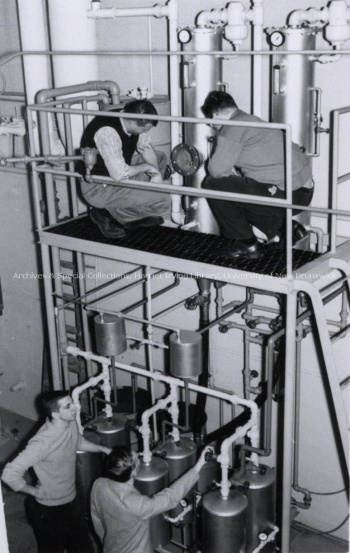Previously named: N/A
Established: 1960
History: Chemical Engineering was first introduced at the University of New Brunswick in 1950 as a three-year program offered alongside others of the same length in Mechanical Engineering and Mining Engineering. The first two years consisted of the same subjects required for Civil Engineering. A full-degree program was introduced by 1960 after a significant increase in registration. A fourth year was added, which gave way to five more Chemical Engineering courses including Thermodynamics, Organic Unit Processes, Industrial Chemistry, Unit Operations, and Chemical Engineering Laboratory. There were fifteen course offerings in the 1961-62 academic year. The first Chemical Engineering class graduated in 1962. Master of Science and Ph.D. degrees were both offered for the first time in the 1960s. By 1967, the program was extended to five years, with emphasis on basic engineering sciences in the first year. The Department's expansion continued steadily for the next few years and by 1975, thirty-four courses were available including the subjects Electrochemical Engineering, Materials and Their Environment, Staged Processes, Fluid-Particle Interactions, and Chemical Process Design.
The 1980s and 1990s saw further expansion of the Chemical Engineering department. Forty-two courses were offered in 1983, including subjects in Energy Policy, Combustion, Adsorption and Catalysis, and Radiative Heat Transfer. The amount of courses under the Department changed little during the 1980s. In the 1985-86 academic year, the Nuclear and Power Plant Engineering option program in Chemical Engineering was added to the Department to allow for further specialization in the curriculum. By 1993, there were fifty-five courses such as Nuclear Chemical Processes, Nuclear Radiation Engineering, and Thermodynamics of Waste Heat Recovery. New program options were introduced in 1994 and 1995, and they were the Pulp and Paper option in Chemical Engineering and Chemistry, the Research option in Chemical Engineering, and the Environmental option. There were sixty course offerings by this point, with fifteen instructors working in the Department. Course offerings changed little by the end of the 1990s and the Instrumentation and Control program option was added by 2000. Some of the courses around this time included Polymer Reaction Engineering and Polymer Processing, Pulp Production, Advanced Nuclear Systems, and Nuclear Safety and Reliability. The Department continued to offer sixty courses each year until 2004 when offerings began to decrease. There were fifty-six courses, which was followed by only forty-nine through to 2006. The number of instructors grew to twenty-five by this time however; the highest number in recent years. In 2007, the Biomedical Engineering option in Chemical Engineering was added to the Department. Two years later, the Department only offered two specialization options, in Energy Conversion Engineering and Biomedical Engineering. Courses offered around this time included Nanotechnology, Nuclear Chemical Processes, Nuclear Safety and Reliability, Applied Petroleum Reservoir Engineering. By the 2012-13 academic year, there were fifteen instructors and fifty-eight courses available through the Department.
Physical location: Sir Edmund Head Hall
Faculty: Engineering
Notes: The year that a certain department was established can be a subjective figure. For the purpose of this wiki, the year that a department is considered first established is the first year it was listed in the academic calendar as an independent chair with no other affiliation, unless documentation can demonstrate otherwise.
Source(s):
- UA Case 84; Section 2.
- UNB Calendars (UA RG 86) 1950-51, 1961-62, 1962-63, 1972-73, 1975-76, 1983-84, 1985-86, 1991-92, 1992-93, 1993-94, 1994-95, 1995-96, 1999-00, 2000-01, 2001-02, 2002-03, 2004-05, 2005-06, 2007-08, 2009-10, 2012-13.
- Main Page
- Anniversaries
- Brief History of UNB
- Buildings
- Faculties and Departments
- Governance and Administrative Positions
- Lecture Series
- Official University Events and Symbols
- People of UNB
- Plaques, Monuments and Structures
- Prizes and Awards
- Sports and Athletics
- Student Clubs and Societies
- Student Events and Escapades
- University Publications
- Women's Sports at UNB
- About UNB Archives and Special Collections
Request an Appointment
Prior arrangements must be made for the retrieval of this material. Please email archives@unb.ca to make an appointment.
Procedures
Help Desk Hours
- Monday - Friday
- 10:00 am - 12:00 pm
- 1:00 pm - 4:00 pm
Contact Us
- 5th Floor, Harriet Irving Library
- University of New Brunswick
- 5 Macaulay Lane, Box 7500
- Fredericton, NB E3B 5H5 Canada
- archives@unb.ca
- Staff Directory
